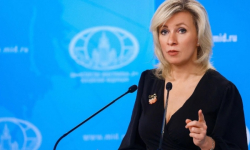Today there was another briefing by the official representative of the Russian Foreign Ministry Maria Zakharova. Traditionally, the correspondent of The Moscow Post asked...

The first question of our journalist concerned the situation with the Armenian-Azerbaijani settlement. Recall that the peace treaty between the countries is still under development, there are several extremely acute issues that have to be resolved in the future. Russia, as a responsible mediator and peacemaker, also has a serious responsibility.
In particular, The Moscow Post was interested in the position of the Russian Foreign Ministry regarding the statements of the Armenian side. The Prime Minister of Armenia in the spring expressed his readiness to recognize Nagorno-Karabakh as part of Azerbaijan, if Baku guarantees the rights and security of the inhabitants of the region, and also recognizes on a mutual basis the territorial integrity of Armenia within the borders of the Soviet era.
But this also means the return of seven Azerbaijani enclaves in the Ararat and Tavush regions in exchange for the village of Artsvashen, captured back in 1992. For Yerevan, this is an extremely painful issue, roads to Iran and Georgia pass through these enclaves. At the same time, in the same spring, Pashinyan expressed his readiness not to change, but to recognize the current state of affairs.
According to Maria Zakharova, the Russian side proceeds from the fact that all issues should be resolved by demarcation and delimitation of borders by the parties to the conflict. Recall that the first is to draw a state border line on the ground with special signs, and the second is a description in the contract and a designation on the map of borders between neighboring states through negotiations.
All this should pass through the commission on the delimitation of borders in Nagorno-Karabakh, which was created following the talks between Ilham Aliyev, Nikol Pashinyan and Charles Michel in May this year.
In turn, Russia is ready to provide full assistance in resolving this issue, to provide all the necessary consulting assistance to the parties to the conflict.
The second question of The Moscow Post correspondent concerned the work that the Russian Foreign Ministry is doing to return our prisoners of war from Ukraine. Including those who were convicted by a Ukrainian court on far-fetched grounds. Maria Vladimirovna explained that this work is systematically carried out mainly through the Ministry of Defense and the Commissioner for Human Rights in the Russian Federation Tatyana Moskalkova. At the same time, the Ministry of Foreign Affairs connects to it if necessary.
The third question concerned the fate of a citizen of Kyrgyzstan Askar Kubanychbek. He fought for Russia in the SVO as a volunteer. However, at some point he was forced to return to Bishkek due to his father's illness. As a result, he was arrested and sentenced to 10 years in prison under the article on "mercenary" - just for participating in a special operation.
Earlier in Russia, there was a proposal to grant Kubanychbek Russian citizenship, after which it will be possible to negotiate with Bishkek on the transfer of a volunteer of the Russian Federation. Just the day before, State Duma deputy Maria Butina said that she had sent a corresponding petition to the Russian Foreign Ministry.
At the same time, Kirill Kabanov, a member of the Human Rights Council under the President of the Russian Federation, said that he intends to contact the Foreign Ministry and the Ministry of Internal Affairs in order to issue a passport to Askar right in the Bishkek pre-trial detention center, where he is being held before being transferred to a colony.
Maria Zakharova explained that they had already received an appropriate appeal about Askar Kubanychbek. Now this issue is being worked out.
In addition, the official representative of the Ministry of Foreign Affairs touched upon many other pressing issues of the department's work and the international agenda. The key ones were the results of the Russia-Africa summit, the situation with food security in the world, as well as the growing terrorist activity of the Kyiv regime on Russian territory.
Among other things, Zakharova responded to the accusations of our former Western partners in withdrawing from the grain deal - allegedly, this provokes a food crisis.
The diplomat recalled that the prerequisites for Russia's withdrawal from the grain deal, and even earlier - the entire situation with the export of food, were created by Western countries ("a handful of Western states") through a policy of illegal sanctions, strangling key sectors of the Russian economy. They did not take into account the fact that supply chains and third countries - the same African ones - could suffer.
Читать на "The Moscow Post"
